My life on the Turkish Mediterranean is one of simple pleasures…
Warm locals, delicious cuisine, and natural splendor. The ancient soul and exquisite beauty of this place embody everything important to me, and I’ve never felt more at home anywhere else…
I moved to the Turkish Riviera town of Kaş in 2018. I’d left my career as a corporate lawyer, gone through a marital separation, and sought "grounding" in a place where I felt like I truly belonged. I’d fallen in love with Turkey a decade earlier, and subsequent visits solidified my belief that I could find "home" here (shocking as it was to my family and friends).
I was immediately drawn to Kaş’ unhurried energy and inviting seaside. I was alone at 52 and didn’t know the language… Yet despite all that, I quickly acclimated to the flow of daily life.
The World’s Best Retirement Havens for 2026
The World’s Best Retirement Havens for 2026
24 Countries Compared, Contrasted, Ranked, and Rated. You don’t have to be rich to enjoy a pampered retirement, you just need to know where to go. With our 35th Annual Global Retirement Index, our experts hand you a detailed roadmap. Details—and a Special Offer—Here

By submitting your email address, you will receive a free subscription to IL Postcards, Overseas Dream Home, The Untourist Daily and special offers from International Living and our affiliates. You can unsubscribe at any time, and we encourage you to read more about our Privacy Policy.
Kaş: An Asia-Meets-Europe Mediterranean Oasis
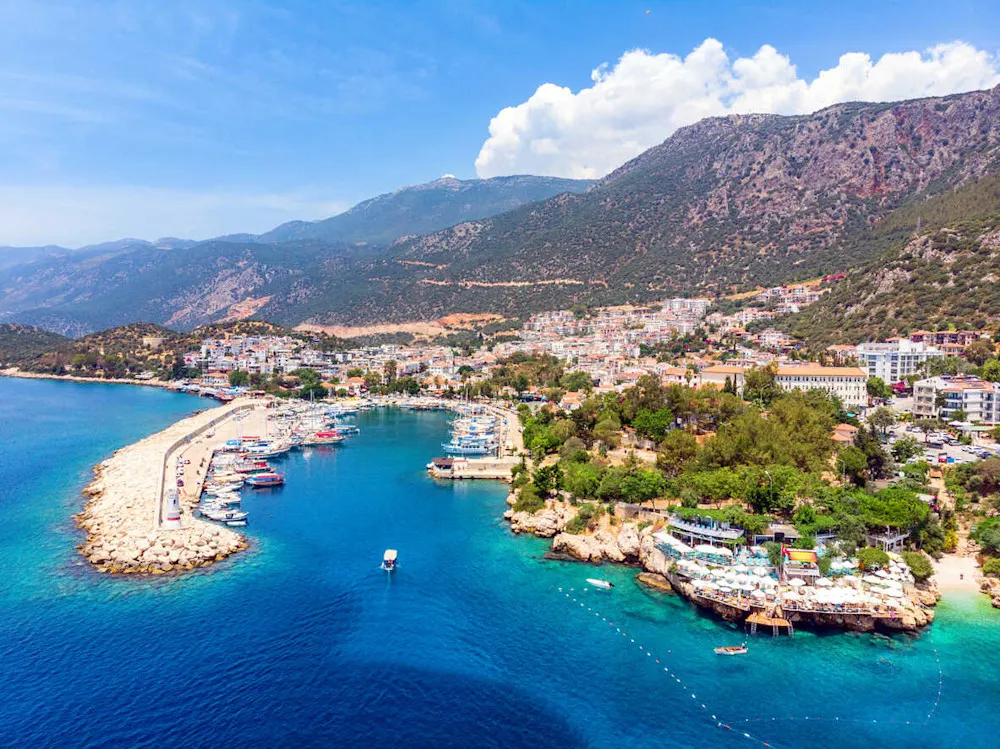
The main square is the heartbeat of Kaş, which has a café culture similar to what you’d find in Italy or Spain. Friends and family gather regularly to enjoy enviable vistas while watching local children run around and show affection to the docile local dogs.
The Friday open-air market is a weekly highlight, bustling with locals, expats, and visitors savoring Turkish tea or fresh juices while browsing stalls of fruits, vegetables, cheeses, olive oil, honey, spices, and handcrafted goods.
The market isn’t just about shopping and errands—it’s a lively blend of commerce and community with infectious energy. It’s also an excellent spot to try crepe-like gözleme, made before your eyes with a variety of fillings, including cheese, lamb, and spinach. This is my type of "fast food." (Try my favorites: eggplant and mushroom.)
In the town center, cobblestone streets are lined with Ottoman-style houses, their wooden balconies adorned with flower boxes. Inviting shops and traditional Turkish eateries sit against a backdrop of bougainvillea cascading down the verdant hillside to meet the sea. The contrasts—intense colors against stark white buildings—are what make this a picture-perfect site.
The region is an archaeologist’s wonderland. Ruins are scattered throughout Kaş, most notably the Antiphellos Theatre, a grand Hellenistic amphitheater standing as a testament to Lycian craftsmanship. Dating back to the 1st century BCE, constructed from local limestone, it originally accommodated up to 4,000 spectators and is uniquely positioned to offer panoramic views of the Mediterranean Sea.
Today, it primarily serves as a historical monument and popular site for yoga and watching sunrises and sunsets.
For a pampering indulgence, a visit to a traditional Turkish hamam is a must. I was a little overwhelmed by my first visit. I didn’t know what to expect and found the exfoliation a bit… assertive. Don’t let this deter you, though. The combination of scrub, steam, and soothing massage results in baby-smooth glowing skin and creates a profound sense of rejuvenation.
The old marina in front of the square buzzes with excursion boats, while a newer one less than a mile away hosts sleek yachts. Parasailing and horseback riding in the hills offer panoramic views. It’s a paradise for hikers, scuba divers, beach lovers… whether you’re seeking adventure or relaxation, Kaş delivers.
Despite its small size, Kaş boasts an impressive music scene. Meyhanes—akin to Greek tavernas—fill the air with traditional tunes, while cafés hum with jazz, soft lounge music, and Turkish classics.
In addition to being pedestrian-friendly, local buses cost less than $1. I love the fact that I don’t need a car, and I combine exercise and errands by walking to town for groceries regularly. A daily walk along the sea is also a given. Here, the crystal-clear Mediterranean ranges from azure to the lightest teal.
Cosmopolitan Kalkan
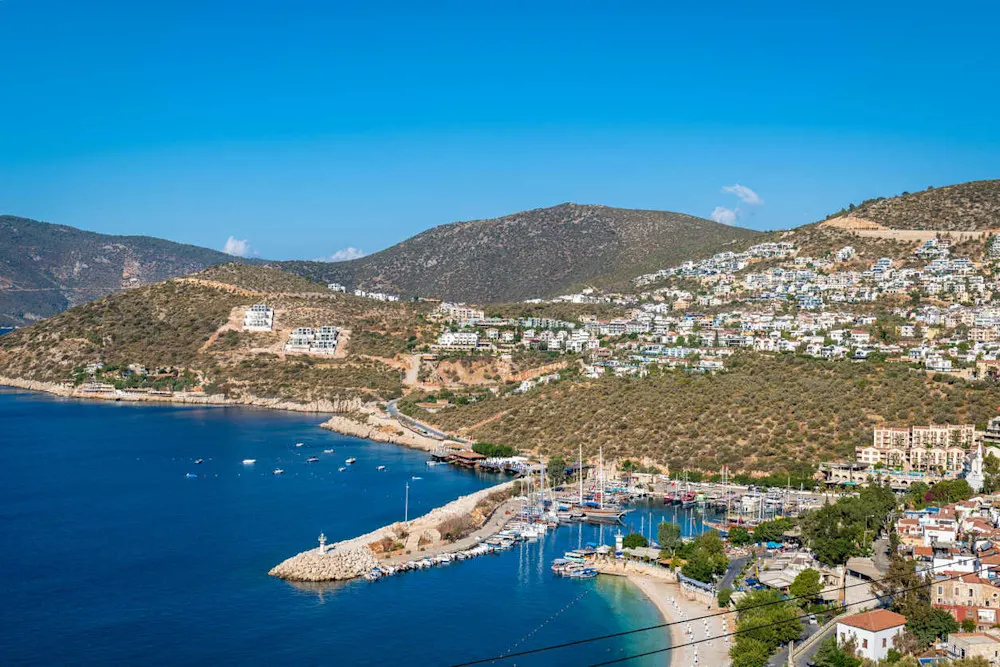
About 30 minutes along a winding scenic road brings you from Kaş to Kalkan. A hidden gem where old-world charm meets modern comfort, Kalkan is characterized by cobblestone streets lined with artisan boutiques, family-run restaurants, and cozy tea houses.
While Kaş maintains its local flavor, Kalkan caters to foreign tourists. Once a sleepy fishing village, it’s now home to a thriving international community. Many business owners speak English and the small weekly farmers’ market is primarily frequented by expats and tourists.
By day the town center exudes laid-back sophistication. The elegance of the Mediterranean is found in the details: a swim in crystal-clear waters, an aperitif at sunset, a cruise along the coast.
Kalkan is especially known for world-class dining. Restaurants serve leisurely Turkish breakfasts, a beloved ritual for residents and visitors. Mornings are for menemen (Turkey’s classic one-pan dish of creamy eggs, ripe tomatoes, juicy bell peppers, and fragrant herbs), honey-drizzled yogurt, multi-colored olives, börek (a flaky pastry usually filled with spinach or cheese), spicy sucuk sausage, and homemade jams.
At night, traditional Turkish dinners and fresh-grilled seafood are served on rooftop terraces under twinkling lights. Many expats and locals end the evening mingling at one of the bars hopping with DJs or live music.
Fethiye and the Blue Lagoon

For those interested in a larger, more local place to live, Fethiye is also a great option to consider. About an hour from Kalkan, it’s a vibrant waterfront town where cobblestone streets and traditional markets lead to a scenic promenade lined with boats and restaurants.
My favorite way to spend an afternoon in Fethiye is a leisurely meal at the famous fish market. This bustling hub is unlike any other I’ve seen, with a circle of vendors selling the freshest seafood, and restaurants ready to grill and garlic your selection to perfection—a true sea-to-table experience. With its lively energy, vendor banter, and enticing aromas, the market is a convivial place to enjoy an afternoon.
This highly-visited town’s most famous attraction is Ölüdeniz Beach, also known as the Blue Lagoon. It’s one of Turkey’s most iconic destinations, with powdery white sand and striking aquamarine waters against a lush mountain backdrop.
If you enjoy hiking and history, the Lycian Way—a 300-mile trail from Fethiye to Antalya—won’t disappoint. Winding through pine forests, coastal cliffs, and villages, it takes you past rock-cut tombs, theaters, and sunken cities.
Antalya, by the way, is a health- and spa-tourism hub well worth visiting, with luxury resorts, world-class hospitals, and specialized clinics. Many offer all-inclusive packages that include airport transfer, language translation, treatment, and accommodation, allowing visitors to seek treatment while enjoying Antalya’s renowned hospitality, scenery, climate, and cuisine.
What It Costs to Live in This Paradise
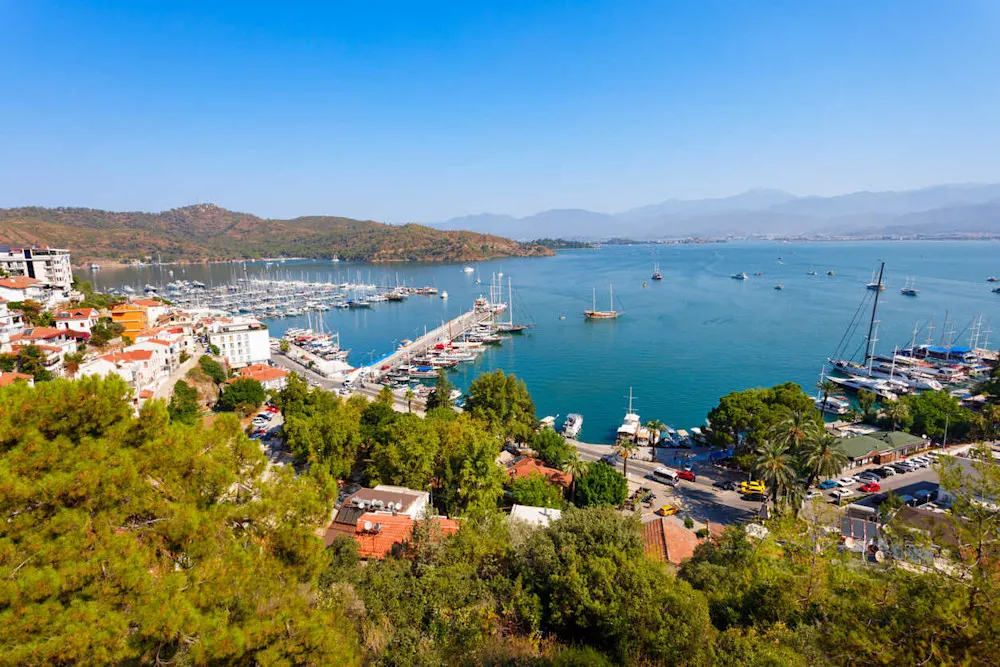
I’ve rented several different apartments throughout my years in Kaş. Prices have significantly increased since I first moved. I used to pay about $250 a month for a one-bedroom apartment, but now pay $500, including water, electricity, and internet, for a modern apartment a couple of miles from the center (where rentals can cost twice as much, particularly during the summer high season). I spend around $1,000 a month on rent and food.
Groceries are still relatively inexpensive compared to the US. Loaves of fresh-baked bread or simit, the slightly sweet Turkish equivalent of a bagel, are less than $1. Fruits and vegetables are seasonal and the best value, lettuce is $1 or less. Fresh seafood, like salmon and sea bass, is plentiful, costing around $6 per filet, while local fish like anchovies and sardines are cheaper, around $3 a pound. Chicken costs about $3 a pound, beef around $5, while lamb is more expensive—about $10 a pound.
Restaurant prices are on par with many in Western Europe. Alcohol is pricier because it’s heavily taxed.
In Kalkan, the cost of living is about 25% higher than in Kaş. One-bedroom apartments start at around $1,000 a month for a long-term lease. A lot of expats own their homes. With a primarily local population, Fethiye is cheaper, with apartments available for approximately $500 a month. There are also more services and conveniences here, like furniture stores, large hardware stores, garden stores, and medical facilities.
The internet is generally stable and good, particularly with extenders. I’ve experienced periodic water and electrical outages, but services have become more reliable with upgrades to infrastructure.
Living Here as a Single Woman
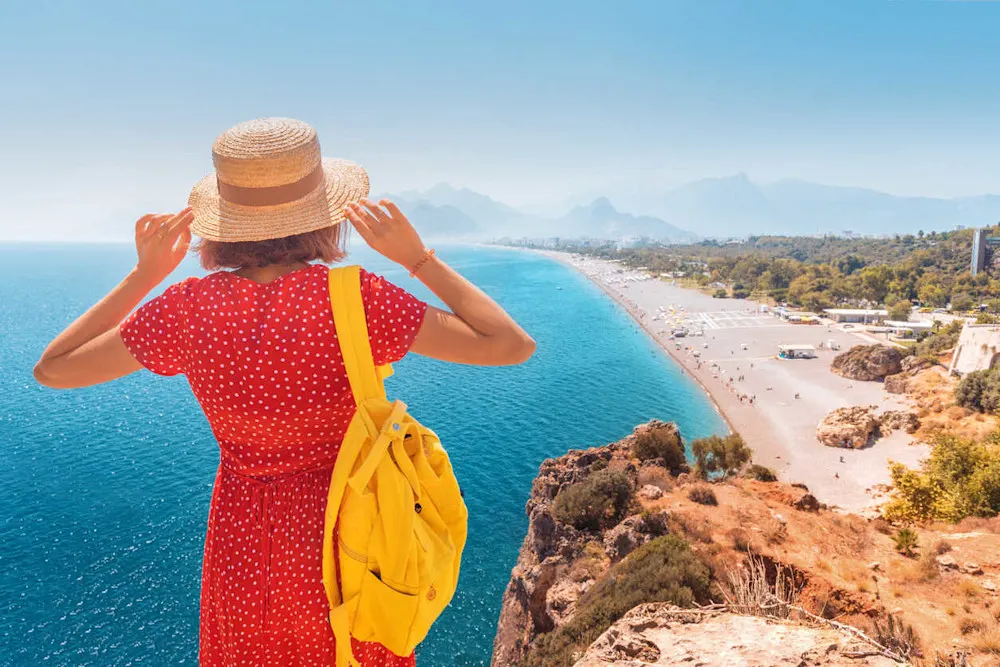
Although Kaş is in Asia, it feels more European to me in day-to-day life. (Just to the north, Istanbul straddles Europe and Asia.) It seamlessly blends a rich history with the pulse of a modern coastal town, offering a quintessential Mediterranean experience combined with omnipresent mosques and the frequent lyrical call to prayer.
Turkey is predominantly Muslim, but it’s also a secular country. There is unequivocal religious tolerance here, but houses of worship other than mosques can only be found in big cities like Istanbul.
As a single woman, I’ve never felt safer anywhere else. Many others, including a few girlfriends that have come to see me, all concur. (As with any country, there are events and places to avoid—protests and certain border areas, for example—check travel advisories before you visit.)
The Expat Community
Kaş, Kalkan, and Fethiye each offer a welcoming expat lifestyle. Kaş has a relatively small expat community, primarily digital nomads and artists. Kalkan boasts a vibrant, well-established, and interactive expat community, particularly popular with British retirees and second-home owners, plus some Australians. Fethiye has a diverse international expat community, well-supported with English-speaking services and a range of social activities.
When I first went to Kaş, relatively few locals spoke English. Turkish workers in restaurants and real estate and tour companies are increasingly speaking more English. Kalkan is more English-friendly; menus and signs are often in English. Fethiye, being a larger town and a hub for international travelers and yacht tourism, also boasts a high level of English proficiency among residents involved in tourism and hospitality.
In all three towns, older generations speak less English, while younger people and those working with tourists are generally more comfortable conversing in it.
The monthly cost of living year-round for a couple in Fethiye starts around $900, in Kaş $1,000, and in Kalkan at least $1,500. Prices vary considerably based on lifestyle, of course. The best deals can be found locally, for long-term or off-season housing.
Facebook pages like Friends of Kalkan, Fethiye Expat Forum, and Kaş and Kalkan Community for Holiday and Friendship can be solid resources to connect with area expats and locals.
This country stole my heart years ago and never let go. It’s the setting for two of my novels. The primary draws were the culture, hospitality, and natural beauty, but there’s something here for everyone.
How To Live In Turkey Long-Term (And Legally)
Turkey (officially Türkiye) does not offer a retirement visa per se. Individuals typically apply for a short-term residence permit, which can be renewed and can lead to long-term residency. Initially valid for up to two years, this permit requires proof of sufficient financial means, which can come from pension income. It’s also available to people who own residential or commercial property here.
After living continuously in the country for eight years under a short-term permit, you can apply for a long-term residence permit, granting indefinite residency.
Turkey has also introduced a digital nomad visa. Applicants must be between 21 and 55 years old and possess a university degree. You must also be employed by a company outside of Turkey, or be self-employed with clients outside the country, with an annual income of at least $36,000.
Turkey does offer citizenship through business and residential property investment. The minimum required investment is $500,000.
Come To Turkey For Healthcare… Or Hair Plugs
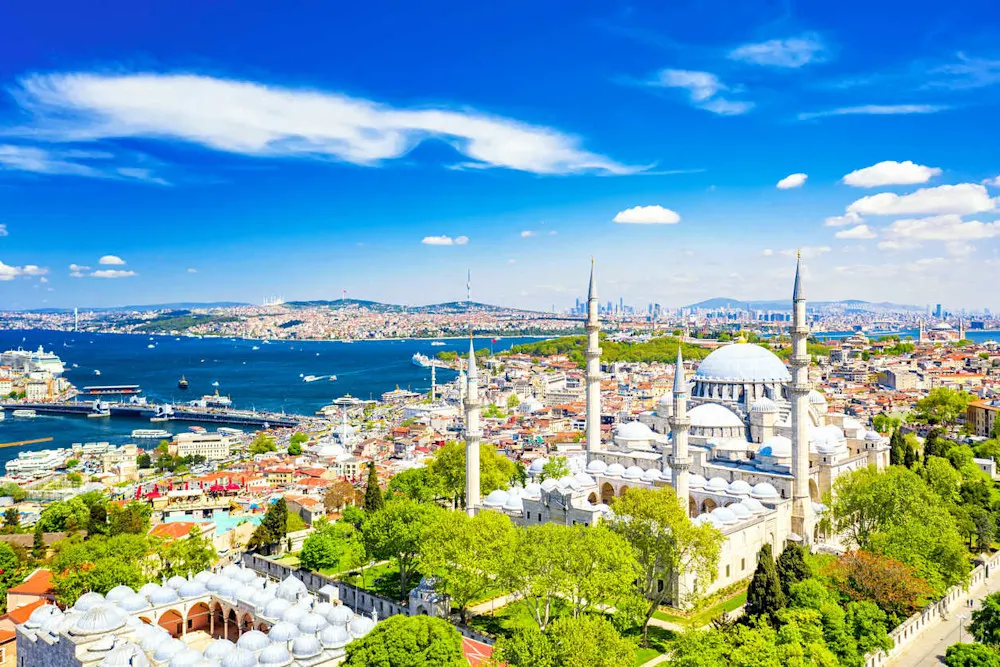
Turkey ranks among the top 10 global leaders in medical tourism, thanks to high-quality, affordable healthcare with cutting-edge technology and world-class facilities. Many hospitals hold "Joint Commission International" accreditation, which means the facility meets high global standards.
Patients can also benefit from holistic treatments rooted in traditional Turkish culture, including herbal remedies, thermal baths, and physiotherapy, used alongside advanced procedures like immunotherapy, ozone therapy, and robotic surgery.
The country’s top medical hubs include Istanbul, Ankara, Izmir, and Antalya (just a few hours from Kaş)—all with international airports. Istanbul is the largest city of course, with an extensive network of state-of-the-art hospitals and internationally-trained surgeons, offering advanced procedures in cosmetic surgery, cardiology, and oncology.
Ankara, the capital, is home to some of the country’s leading university hospitals and research centers, particularly in complex surgeries and cancer treatments. On the coast, Izmir is gaining traction for dental, orthopedic, and holistic treatments, often combined with wellness tourism.
Turkey is particularly renowned for cosmetic surgery (including body contouring and facial surgery), dental care, and hair transplants. Costs are significantly lower than in many Western countries, ranging from $2,000 to $4,000 vs. $10,000 (in the US) on average. (See our full exposé on medical tourism here.)
The World’s Best Retirement Havens for 2026
The World’s Best Retirement Havens for 2026
24 Countries Compared, Contrasted, Ranked, and Rated. You don’t have to be rich to enjoy a pampered retirement, you just need to know where to go. With our 35th Annual Global Retirement Index, our experts hand you a detailed roadmap. Details—and a Special Offer—Here

By submitting your email address, you will receive a free subscription to IL Postcards, Overseas Dream Home, The Untourist Daily and special offers from International Living and our affiliates. You can unsubscribe at any time, and we encourage you to read more about our Privacy Policy.
